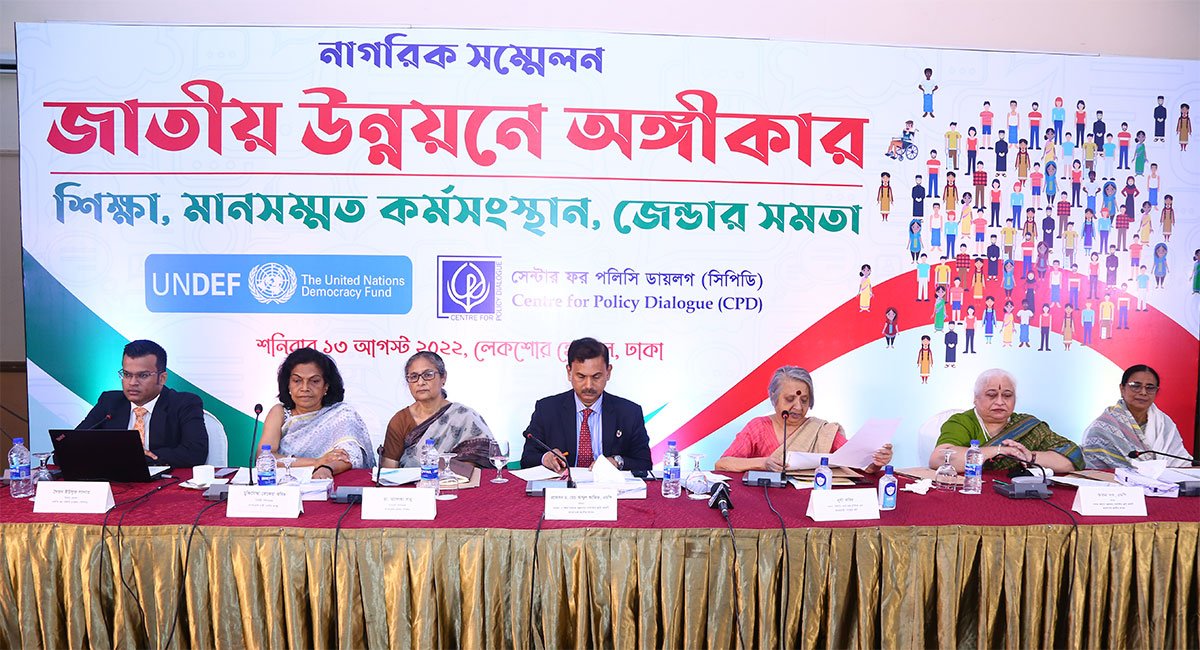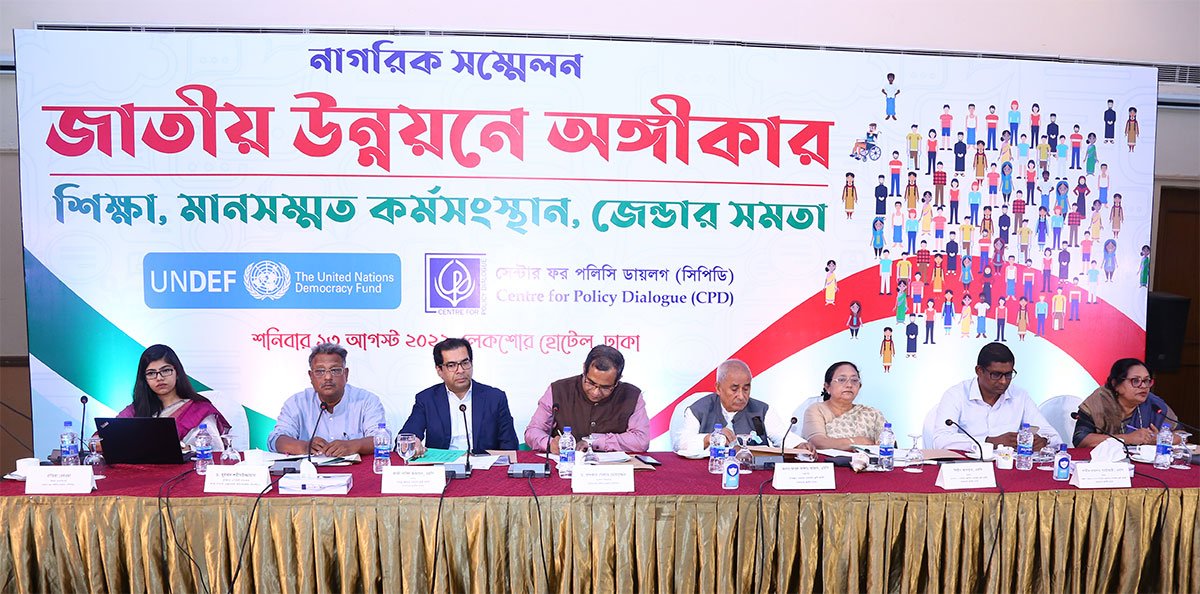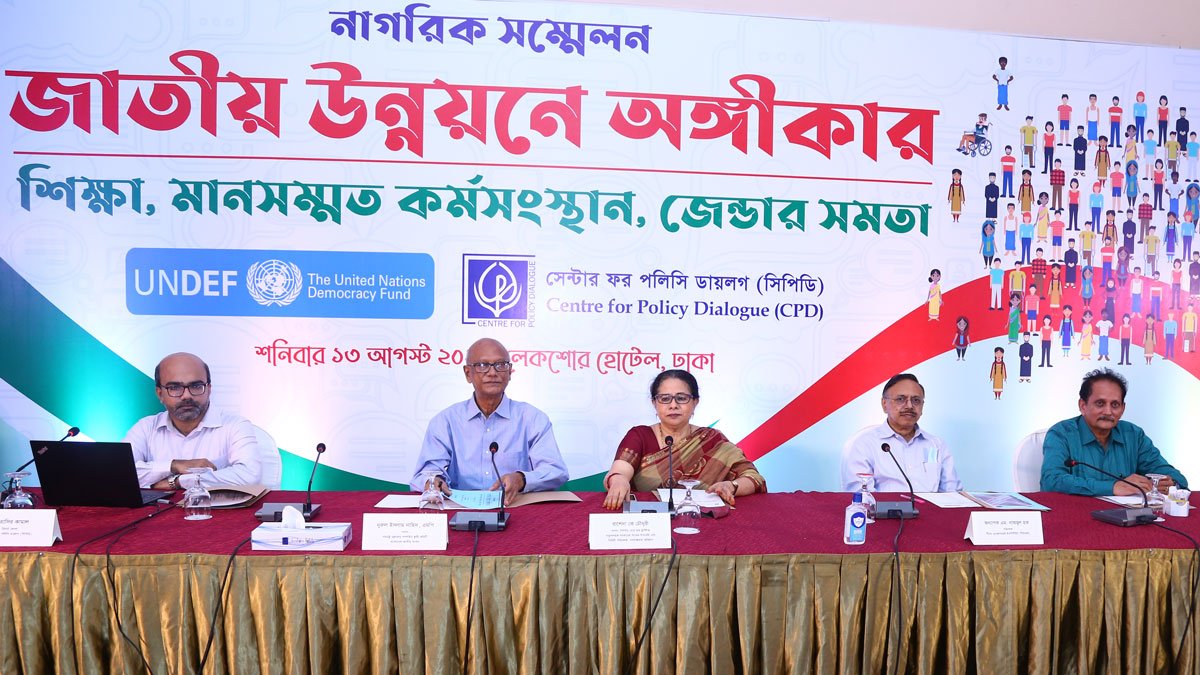
The election manifesto of a political party is an important document that can be used to evaluate the party’s accountability. In order to grab voters’ attention, political parties in Bangladesh make numerous promises in their election manifestos. Although there are precise and goal-oriented features to election promises, the majority of them are not realistic and are made solely for campaigning objectives. Again, there is typically no appraisal of the extent to which this promise has been fulfilled. For these reasons, the manifesto is somewhat less significant to the citizens. Consequently, in the majority of cases, elected representatives do not feel accountable for the fulfilment of the promises they make, despite the fact that the fulfilment of election promises is an essential component of a robust democracy. In this backdrop, it is critically important that the implementation process monitoring of the commitments is done based on a bottom-up approach involving the participation of the broader stakeholders.
Prior to the National Election 2018, major political parties and alliances announced election manifestos promising a number of issues. The current ruling party, Bangladesh Awami League, published a detailed election manifesto titled “Bangladesh on the march towards Prosperity: Election Manifesto 2018.” After the elections, there was little discussion of the extent to which these pledges were fulfilled. In light of this, it is essential to monitor the implementation of commitments for public engagement. The extent to which the recent election manifesto has been reflected in the government’s policy actions during this post-election era, can be assessed for evaluating the execution of the pledges mentioned in the manifesto.
In the above context, Centre for Policy Dialogue (CPD) in partnership with the United Nations Democracy Fund (UNDEF), organised a daylong conference titled ‘জাতীয় উন্নয়নে অঙ্গীকার: শিক্ষা, মানসম্মত কর্মসংস্থান, জেন্ডার সমতা’ (Commitment to National Development: Education, Decent Employment, Gender Equality), on Saturday, 13 August 2022.
Dr Fahmida Khatun, Executive Director, CPD chaired the opening session and briefly discussed about the initiative titled “Advancing Responsiveness and Accountability through Citizen Engagement in Bangladesh”. She underscored that the three thematic areas namely Education, Decent Employment and Gender Empowerment were chosen because these are crucial in achieving Sustainable Development Goals (SDGs). “We have successfully been able to develop Election Manifestos but we have not been able to improve the implementation status of these pledges.” said the Executive Director of CPD.
In his keynote presentation, Dr Khondaker Golam Moazzem, Research Director, CPD, highlighted that people at the grassroots level lack a clear idea about the electoral pledges and that the needs of these people are rarely reflected in the Election Manifestos. In addition, he provided some recommendations and insights from those who participated in the FGDs and local level dialogues organised as part of this initiative.
“No communication between the government representatives and the citizens occurs before and after the election” said Dr Tofail Ahmed, one of the Distinguished Discussants of the opening session. The local government expert also said that the citizens are rarely aware of the pledges included in the Election Manifestos.
Distinguished discussant Ms Khushi Kabir, Member, CPD Board of Trustees and Coordinator, Nijera Kori, emphasised the education sector and said ‘Bangla is also not taught properly in our Educational Institutions.’ She said that Mathematics and other subjects are important but we should be concerned if we are weak in our own mother tongue.
The Chief Guest of the conference, Mr M. A. Manan, MP, Hon’ble Minister, Ministry of Planning, Government of Bangladesh, said “In the last 12 years, Bangladesh Awami League had many shortcomings, but it also had many achievements”. He added that people always request for a stable environment where they can earn a decent income and Awami League has been working to bring this into fruition. He also shared some of the most common requests that he heard from rural citizens and said “What people want most is social allowance cards, food and water supply, sanitation, roads, culverts in the area and a chance to get a good job”.

In the first session, on the theme of Gender Empowerment, the keynote presenter Mr Syed Yusuf Saadat, Research Fellow, CPD, highlighted the electoral pledges in the 2018 Election Manifesto, such as increasing the number of female students in higher education, providing banking facilities for female entrepreneurs, expansion of Joyeeta Foundation, equal wages for both men and women, and creating more day care centres. He also delineated the implementation status of these pledges and underscored the recommendations that were collected from the FGDs and Subnational dialogues. Ms Khushi Kabir, Member, CPD Board of Trustees and Coordinator, Nijera Kori chaired the session.
“There is a wage disparity between men and women in the areas outside Dhaka” said special discussant Ms Moshfeka Razzak, Female Leader, Rangpur. She clarified that female workers are hired mostly because they require lower wages and work more but owners always justify their low wages by saying that they are less productive than men.
Dr. Maleka Banu, General Secretary, Bangladesh Mahila Parishad, emphasised on contribution of women and said “Gender Sensitivity should be considered while preparing Election Manifestos and both the female policy-makers and citizens should participate in it, just like they actively participated in Liberation War and are participating in the development of this country”. She said that we need to take a look at our education system and observe if it teaches about gender equality. She recommended that the perspective about women should be improved and pledges should include initiatives that will prepare female entrepreneurs to withstand the upcoming challenges in the future.
Emphasising on the root causes of gender inequality, Ms Rokeya Kabir, Executive Director, BNPS, said “We are being treated as second- or third-class citizens as we do not have equal rights within the family and in case of inheritance.” She explained that as long as women are financially dependent on others, they will never be able to experience freedom.
Ms Aroma Dutta, MP, Member, Standing Committee on Ministry of Social Welfare, Bangladesh Parliament focussed on different forms of violence against women and said “Violence against women is a major obstacle in achieving gender equality”. She stated that although there are laws in place to protect women from abuse, they are not being enforced properly and steps should be taken to rectify this situation.
The Special Guest Professor Dr. Md. Abdul Aziz, MP, Member, Standing Committee on Ministry of Women and Children Affairs, Bangladesh Parliament, said ‘Women can participate equally if we can create the right work environment. Due to the ignorance of many parents, girls become victims of child marriage and drop out of school.’ He also discussed about child marriage during the pandemic and its impact on the upcoming generation’s health due to being prematurely born.
The session had an open floor discussion where people said that pledges should include issues such as reducing child marriage, women’s safety, Day Care centres for the children of both working men and women, changing stereotypical perspective, considering all genders while preparing Gender Sensitive policies, and about training female entrepreneurs.

The electoral pledges of Decent Employment were highlighted in the second session of the conference and it was chaired by and Dr Khondaker Golam Moazzem. He said that some pledges in the manifesto have been implemented, some are undergoing the process of implementation and some have not been implemented at all. He opined that the reason behind unimplemented pledges could be the obstacles created during the pandemic.
‘A review of the implementation status of the pledges on the Decent Employment theme shows that many pledges have been implemented but it is not enough to generate adequate employment’ underscored by Ms Ratia Rehnuma, Research Associate, CPD. She discussed both the specific and non-specific pledges on Decent Employment in the 2018 Election Manifesto, their implementation status and the recommendations that were received during the FGDs and the Subnational Dialogues.
The special discussant Ms Shamima Sultana Shilu, Divisional Head, BWCCI, said “A decent working environment for women must be ensured so that women can work comfortably in offices”. She clarified that an appropriate working environment for females should include decent behaviour of the employers, clean female toilets, breastfeeding corners, providing adequate maternal leaves and the recruitment process should focus on merit only. She suggested that the government should take initiatives to ensure that the income of female entrepreneurs is not forcefully taken away by their husbands or families.
“Decent employment and a good working environment should be ensured for both formal and informal sectors and training and skill development should be aligned with International Standards” said by the discussant Dr Md. Shahid Uz Zaman, Founder & Executive Director, Eco Social Development Organization (ESDO).
Special Guest Mr Shameem Haider Patwary, MP, Member, Parliamentary Standing Committee on Ministry of Law, Justice and Parliamentary Affairs, Bangladesh Parliament, emphasised on the role of government in creating a decent work environment and said that although it was appealed to improve the working environment, no progress has been made. He said “Employees who work in tourism have a daily income of TK 250 and they are not paid for any overtime, pension, Eid Bonuses, and gratuity” He clarified that if the government cannot ensure a decent work environment in its own premises, we cannot expect the same in other areas.
Mr Kazi Nabil Ahmed, MP, Member, Standing Committee on Ministry of Finance, Bangladesh Parliament, said that the government always takes the right decision at the right time and this has already been reflected during the pandemic and in the post pandemic era. He highlighted that the government took initiatives to ensure self-employment and said “Because of Digital Bangladesh, several Bangladeshis can now live in Bangladesh and work in foreign countries, so we are gradually taking steps towards improving the opportunities of employment here”.
Shirin Akhter, MP, Member, Standing Committee on Ministry of Primary and Mass Education, Bangladesh Parliament, highlighted the employment criteria of ILO and said that the government should work on creating employment opportunities based on ILO criteria. Initiatives should be taken to improve the skills of these workers as well.
Abul Kalam Azad, MP Chairman, Standing Committee on Ministry of Planning, said that in South Asia, there is more women empowerment in Bangladesh than in the surrounding countries and women are doing well in the job sectors as well.
Participants in the open floor discussion opined about decent work environment and said that the behaviour of employers should be improved, circulars of jobs should be open for all, people should hire employees based on skills only, increasing opportunities of employment, increasing job opportunities for disabled people and illegal activities in the process of hiring should be reduced.

“Society is not harmed by illiterate people, it is harmed by ignorant behaviour of educated people.” said by the chair of the third session, Ms Rasheda K Chowdhury, Member, CPD Board of Trustees, Former Advisor to the Caretaker Government and Executive Director, CAMPE. Emphasising on the theme of education, she highlighted the current situation of education in Bangladesh and said that many schools do not have complaint boxes or committees to deal with harassment of female students.
Mr Muntaseer Kamal, Research Fellow, CPD, delivered the keynote presentation and said that ‘Before the last national elections, the election manifesto of the current ruling party gave considerable importance to the education sector. However, not enough information is available on the current status and progress of these pledges. He emphasized on the electoral pledges made in the Education Sector, discussed their implementation status and highlighted the recommendations from the FGDs and the Subnational Dialogues.
The distinguished discussant Professor M Nazmul Hoque, Director, Teacher development Institute (TDI), said that although the fund allocation in the Education sector has been increased, but the quality of education has not improved. Therefore, more focus should be given to improving the quality of education by recruiting skilled teachers and not making the recruitment process commercial. He clarified ‘If the quality of the educational institute and teachers are improved, the quality of students will improve as well.”
‘The students do not have enough general knowledge, for example, a science student doesn’t know the date of Independence Day.’ said by the special discussant Shaikh MD Rafiqul Islam, Head Teacher, Pallimongol Madhdhomik Bidyaloy. He suggested that students should be encouraged to explore other subjects other than science and should gain adequate general knowledge.
Special Guest, Mr Nurul Islam Nahid, MP, Member, Standing Committee on Ministry of Foreign Affairs, Bangladesh Parliament, emphasised on technical education and said that technical schools have been established in many Upazilas. He also said “Due to pandemic and economic crisis, many students dropped out of schools”. He clarified that initiatives are being taken to improve the quality of Education but the schools must retain students to ensure that they receive it.
In the open floor discussion of the last session, the people said that the details of allocation of funds in the Education Sector should be discussed with the citizens. In terms of recruitment of teachers, they suggested that incompetent teachers should never be appointed and initiatives should be taken to train teachers after they are appointed. They also provided some academic recommendations such as text books should be distributed equally to all citizens, students shouldn’t only focus on taking science as their major, patriotism among the students should be increased, and coordination between primary and high school should be improved.
The conference was attended by Hon’ble Members of Parliament, Ministers, Civil Society Members and participants from Rangpur, Rajshahi, Khulna, Jessore, Bagerhat, Barisal, Satkhira, Patuakhali, Barguna, Chattogram, Jhalokathi, Meherpur, Gaibandha, Lalmonirhat, Chuadanga, Natore and Sirajganj, many of whom participated in the open floor discussion. Journalists from both print and electronic media were also present.


